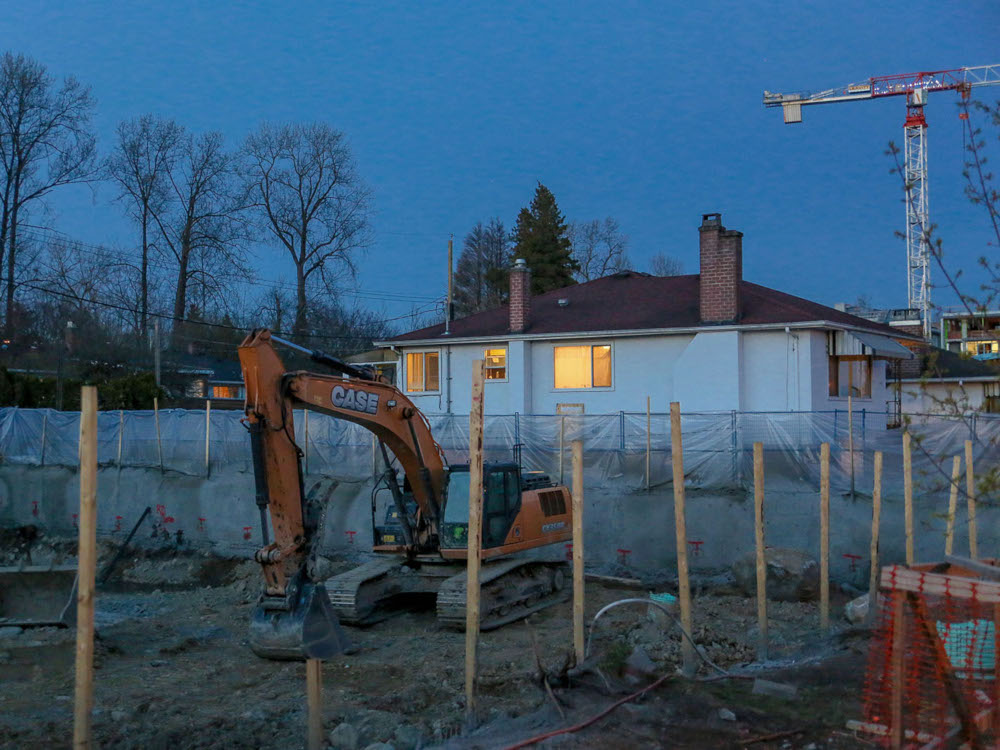[Editor’s note: Tom Davidoff and Patrick Condon are both professors at the University of British Columbia, and both have regularly opined on our regional housing crisis, a crisis that is particularly severe in the city of Vancouver.
But there the similarity ends. They differ dramatically in how they define the housing problem and in the solutions they propose.
After following some of their online discussions, we thought it would be interesting to bring their debate to the broader Tyee audience. What follows is the result of their unbridled (except by word length) back and forth on this topic. It’s been lightly edited for clarity.]
Patrick Condon: Tom, thanks for agreeing to do this. I want to get right to the point: the housing market is completely broken and any strategy that depends on market forces, or the so-called laws of “supply and demand” (which are not laws — even Adam Smith knew that) is doomed to fail. Nowhere in the world is that failure more obvious than in Vancouver which has, by many measures, the most unaffordable housing in the world, even while housing production is exceeding the rate of population growth. For god’s sake, Canada is a signatory of the UN Declaration of Human Rights. That declaration commits all signatories to treat housing and health care as human rights. We provide decent health care for all our citizens. Why not housing? It’s past time to do the right thing.
Tom Davidoff: Thank you, Patrick. Vancouver is expensive, and likely to get more so in the long run. As a high-amenity city with excellent climate, government and economy by global standards, where people and the almighty have conspired to make building homes difficult, we are at risk of becoming a playground for the global elite.
But it is not the market that is broken. As anywhere, businesses aim to make as much money as quickly as possible without running too far afoul of the law. Homes are a very large share of owners’ wealth, so they are eager to defend their turf. Until recently, though, government policy towards housing made our inherent affordability problems worse. We have a ways to go, but things have gotten better.
Our tax code through mid-2016 told the world, “Buy homes here, but don’t try to make a living.” Mission accomplished: we have a very high ratio of housing cost to incomes. That’s terrible policy in a supply-constrained city. With the empty homes tax, the speculation tax, the additional school tax and limits and taxes on short-term rentals, we are now sending a very different message to the world: don’t invest in homes here unless you are going to make a living here or rent the place out.
Second, we have dedicated most of our land to detached single-family homes, even in the City of Vancouver. When land costs tens of millions of dollars per acre, that can’t be affordable. Governments literally enforced rules that excluded 90 per cent of residents from buying homes on most of our land. In the last few years, Vancouver, Burnaby, the City of North Vancouver and other municipalities have been selling off the right to build at high density. That is producing tens of thousands of homes that will be used by locals, given the new tax rules. And it has provided cities with hundreds of millions of dollars that can be used to provide assistance to families struggling with affordability.
Even under the best of government policy, some people will not be able to afford to live decently in Vancouver without significant help from the government. Some of those people should get cash assistance from the government, and for some households in trouble, the government needs to provide or fund temporary shelter. But it is not possible or desirable for government to provide a giant discount on a publicly owned home to every resident of Canada who wants to live here. So you are going to have to be more specific on who has a right to what kind of home in Greater Vancouver.
Patrick Condon: Well Tom, you sure know how to lay down the gauntlet in a seemingly irrefutable way. Sure glad I never had to submit an essay to you for a grade!
But let me attempt a few points in response. You make it sound like Vancouver is oh-so-special with its government, climate, economy and amenities. But I have heard this same claim made by apologists for market failure everywhere — Sydney, Christchurch, San Francisco, Boston, London, Paris, even Toronto. Good climate and amenities don’t explain this.
And in our case, it sure ain’t our economy. Vancouver is, as that old joke goes, a city without visible means of support. It has no head offices, a marginal resource economy, and not much else. It seems that its main industry now is as a place to park global wealth in “cash boxes in the sky” condo projects and have the same laundered if it’s dirty.
Your explanation is inadequate, methinks. I prefer a broader diagnosis. Vancouver has become the global poster child for out-of-control asset inflation. Cheap money and the flow of same to the one per cent has created a global sellers’ market for all asset classes around the world — stocks are now far overpriced for their dividend potentials, and real estate is now far overpriced compared to local wages. I could go on to try to undercut your faith in what I think are the too-little, too-late provincial tax responses, but I will save that one for later.
I want to turn to your claim about the city of “single-family homes” causing unaffordable housing, because that one is key. First off, we have not had “single-family zoning” in Vancouver for decades. Every house that might look like a single-family home can legally have both a rental suite and a lane house on the same property. That means that minimum density everywhere in the city is three dwelling units per lot, not one. At typical lot sizes of roughly 3,500 square feet, that’s a bit under 1,200 square feet per dwelling unit, or 36 dwelling units per acre. In most parts of North America that is at the high end of townhouse development density. I’m not saying that we should keep things exactly as they are, only that any claim that it is low density that is keeping prices unaffordable is not supported by the evidence. Evidence suggests that any time the city allows additional density on a parcel, all that happens is the parcel price jumps, so that the only benefit goes to the landowner, not the homebuyer.
Finally, yes Tom, under these circumstances we surely do need to provide help to, as you put it, “some people” who can’t afford the market home rates. The problem is that “some people” are now more than 50 per cent of all people working in this city (if you use average wages as your benchmark). When you get to half or more of folks unable to afford housing you need something more aggressive than just helping “some people.” I would argue that any decent city worth the name should, as a routine matter, have enough affordable homes for anyone willing to work hard and raise a family here. I don’t like the idea that the middle class can never again live in Vancouver. I can’t accept that, even if our new mayor can.
Tom Davidoff: If you know at which rate to discount cash flows better than the stock market and other asset markets in which smart people with deep pockets play, te salut.
However, for those most impacted by affordability problems, it is not prices but rents that matter the most. And asset market peculiarities do not explain why we have an affordability problem with rents. Our rents are high because too many people are chasing too few housing units. The private sector wants to build more units. The public sector should encourage that. Empty homes tax data tell us that most homes are not just cash boxes in the sky, but also owner-occupied or rental housing. And with the empty homes and speculation taxes, that should be increasingly true as the tens of thousands of condos that were presold in the recent price boom complete in the next few years.
What can government do to ensure that our currently healthy multifamily supply levels continue? Sell off more of our restrictive zoning. Let’s quickly resolve what kind of multifamily buildings belong in our expensive single-family areas. Brooklyn allowed townhouses to be built in Park Slope, a neighbourhood internationally renowned for great architecture and high prices, 100 years ago at a density about double what our RS zones (low density residential zones that cover about 60 per cent of the city) allow today. But our prices today are about the same as Park Slope’s prices today. Those townhouses, built based on the prices of 100 years ago, are better regarded by architecture enthusiasts, even more than our own Vancouver Specials, so their density, a “floor space ratio” of about 1.5, is one starting point. Then we can decide how many we want built each year in our current low-density areas, and then let developers bid for the rights to build those units. Just like governments sell wireless spectrum and mineral leases, we can auction off our bad zoning. We’ll get market choices for the upper middle class, take pressure off the rest of the purchase and rental markets, and get cash to spend on the people who need help to stay here. If land prices rise when zoning is relaxed, that is very close to proof that the previous zoning was sub-optimally restrictive. If you want that increase in land value to go to people struggling with affordability, use my proposed auction approach.
You argue that “any decent city worth the name should, as a routine matter, have enough affordable homes for anyone willing to work hard and raise a family here.” How many people all over the world would love to work hard and raise a family in Vancouver? I am guessing more than the number of housing units you are prepared to fit in the city. If you support immigration, but don’t like gentrification, then you are going to have to allow some serious densification.
That takes us to the question of how to allocate the housing units you are prepared to permit. The market approach would be: whoever already owns a place or is willing to pay more than the incumbents gets a home.
Unfortunately, some households don’t have enough money to get a unit within a reasonable commute of the place they would like to put in that hard work. Do we use taxpayer money to buy some units and give them to some of those who are shut out? That would amount to a redistribution lottery for very large housing subsidies. The “second fundamental welfare theorem” tells me that rather than hold a lottery for huge housing prizes given to a small number of eligible households, a better approach would be to sell developers the right to build new units and sell them at market prices, and use the profits from selling those rights to give small cash benefits to every member of the population deemed in need of assistance.
Patrick Condon: For the sake of our readers and to try to find closure, let’s tease out things we agree on. First off, I think we can agree that you think the market, if unfettered (by restrictive zoning for example), would more ably supply housing at volumes and prices much more in line with wages than at present. You state that if land prices increase in response to up-zoning land, then we might opt to recapture that increase and use it for “people struggling with affordability.” I can agree to that.
Where we might differ is the extent to which we need to recapture that value, how we measure how many people we want to help. I argue that the measure of who to help is the number of people who work in the city but are “struggling” to live here, and the critically housing insecure and the homeless.
I’m very aware that this is a high bar and not one that we have collectively accepted as an obligation since at least the 1980s. Other countries have successfully met this goal, but not ours. Not lately. So I would happily see density increases sufficient to even double the current population of the city and have proposed the same for more than a decade. But only if this did not mean the loss of middle-class occupants of the city. When the mayor justifies his rabid support for the Broadway subway by saying that we mostly need it to move middle-class workers in and out of the city they can no longer afford — that is for me a bridge too far (or perhaps a subway too deep?). So would you agree with me that our political challenge is now, in essence, to decide what proportion of those who are struggling to find housing in this city we should help and calibrate our policies to that number? Do you think it is even possible to accurately gauge that and present such a strategy to the body politic for their action?
Tom Davidoff: I am all for common ground, and thanks to you and The Tyee for the dialogue. The common ground won’t be about whether transit should be above or below ground. As long as affluent households are paying high rents and prices near SkyTrain in the suburbs, it isn’t reasonable that subsidized families get first dibs on more central locations inside City of Vancouver limits. We need the whole region to step up (with a small “s” and “u”) its land use game. I think future generations would thank us for the subway. But I grew up in Brooklyn, so maybe I’m biased.
I think we agree there is more room for municipalities and the province to benefit from sky-high land values, be it through higher property taxes or a better mousetrap for getting landowners and developers to reveal how much they would pay for the right to build at greater density. That is the essence of my zoning auctions proposal. And we agree the benefits should accrue to people who want to make a living here but find that challenging given the high level of prices and rents. Lower income and sales taxes? A means-tested housing allowance? Direct government investment in rental housing? We can leave those questions to the next time. ![]()
Read more: Rights + Justice, Housing

















Tyee Commenting Guidelines
Comments that violate guidelines risk being deleted, and violations may result in a temporary or permanent user ban. Maintain the spirit of good conversation to stay in the discussion.
*Please note The Tyee is not a forum for spreading misinformation about COVID-19, denying its existence or minimizing its risk to public health.
Do:
Do not: